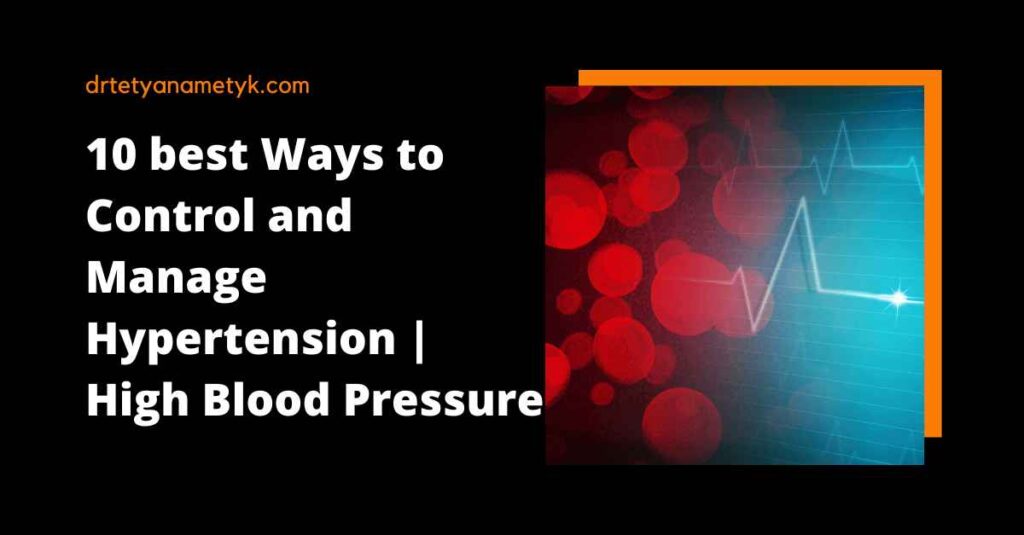What does hypertension mean?
Hypertension is a medical term that consists of “hyper” and “tension.” Hyper means more than normal quantity, and tension is a force. So, hypertension implies a force that is more than is required.
The biological meaning of hypertension:
In biology or medicine, “Hypertension” is related to high blood pressure, i.e., blood pressure is associated with the rate at which the heart pumps blood when the heart works at a faster rate or more than the normal quantity required for a healthy body, when the heart keeps pumping blood irregularly or at a faster speed which increases the pressure against the artery that it does not remain normal at all and lead to particular disease most commonly heart disease.
Major symptoms of hypertension
Talking about major symptoms of hypertension that can make you think about their medical condition seriously includes the following diseases or medical situations:
- Critical headache situation.
- Bleeding through the nose.
- Tiredness or discomposure.
- Problems related to sight.
- Pain in the chest.
- Breathing difficulties.
- Uneven heartbeat.
- Presence of blood in the urine.
- Feeling weight into your ears, neck, or chest.
All the symptoms mentioned above are only shown when the hypertension situation becomes severe, dangerous, or at-risk. One of the most disturbing things about hypertension is that it does not show symptoms normally. Still, when that patient reaches an alarming situation, treatment is crucial. One-third of hypertension patients do not know that they are suffering from hypertension.
Major causes of hypertension
The exact causes of high blood pressure are unclear, but few are known. Some points that are listed below are among the major causes of hypertension:
- Sedentary lifestyle, i.e., not doing enough physical work.
- Lack of proper exercise.
- Deficiency of proper diet like fruits and vegetables that are a source of dietary fibers.
- Using oils in your food more than that is required.
- Excess amount of salt in regular food.
- Age factor like age more than 60 or 65 at which walls of arteries become weak.
- Unmanaged resting schedules, i.e., lack of proper sleep and having restless life.
- Taking an increased amount of caffeine like coffee and tea.
- Having a weight that is more than normal.
- Some medical conditions like kidney diseases, diabetes, thyroid problems, etc.
- Medicines that contain steroids, anti-inflammatory drugs, or NSAIDs (non-steroidal anti-inflammatory drugs).
Avoiding all these causes, maintaining a healthy lifestyle, exercising regularly, and having a proper diet can reduce the risk of hypertension even at old age.
Best ways to control hypertension
Hypertension is not itself a medical emergency but can lead to severe medical disorders that could be dangerous. If detected in the early stages can be controlled. Following are the ways to control hypertension:
- Manage a healthy body weight.
- Exercise regularly.
- Take less caffeine.
- Avoid intake of alcohol and avoid smoking.
- Eat healthy food (try the DASH diet).
- Proper and quality sleep.
- Reduce stress level.
- Avoid self-medication.
- Lowering your sodium intake.
- Visit your doctor regularly.
Now you will look at a brief overview of all these ways to control hypertension.
Manage a healthy body weight
Bodyweight is a major thing that is related to hypertension, an increase in body weight will ultimately increase the body’s blood pressure. It would be best if you regularly manage your body weight. If a person is obese and he reduces even a pound of weight will help in the decrease in hypertension. Bodyweight should be managed according to body mass index that varies from person to person. Studies show that if a person loses 8 kg weight, it will help reduce 8.5 mmHg systolic blood pressure and 6.5 mmHg diastolic blood pressure. Weight loss is related to exercise that can be managed through a good or healthy diet and regular exercise.
Exercise regularly
Maintaining a healthy lifestyle is vital to making yourself healthy and avoiding a sedentary lifestyle, and remaining active throughout the day. And apart from it, taking out at-lest 30 minutes daily for morning exercise will help reduce hypertension and prevent many other diseases. Aerobic exercises such as running, jogging, swimming, cycling, and dancing, cardiac exercises are also helpful in maintaining healthy blood pressure. Exercising helps to make the heart stronger, and arteries become powerful to resist blood pressure. This will help to avoid hypertension.
Take less caffeine
Caffeine contains different receptors that stimulate high blood pressure and increase heart rate. It is basically a vasoconstrictor that is directly related to hypertension. Caffeine works as a simulator that can activate the brain and nervous system. Controlling levels of caffeine in daily diet helps to maintain a healthy lifestyle. The effect of caffeine can be tested after 30 minutes of caffeine intake, and results will show an increase in blood pressure.
Avoid intake of alcohol and avoid smoking.
When attached to blood vessels, calcium increases the sensitivity of blood vessels and constricts them. Constriction of vessels will increase blood pressure and lead to hypertension. Alcohol increases the amount of calcium in the body that binds to blood vessels. So, individuals suffering from hypertension will altogether avoid the intake of alcohol.
The nicotine present in cigarettes and other tobacco products reduces blood vessels. It increases the blood flow rate and ultimately increases the blood pressure and heart rate. Smoking can increase blood pressure by 5 to 10 mmHg immediately after taking a cigarette.
Eat healthy food (try the DASH diet)
Taking a diet that is lower in cholesterol, rich in dietary fibers, containing good fats such as wheat, oats, fresh fruits, vegetables, and a balanced diet helps maintain a normal blood pressure level. Beans, oats, and flaxseed contain soluble fiber that lowers the low-density lipoprotein and helps to lower the cholesterol level in the blood. Taking excess water, a diet rich in magnesium (increase nitric oxide and reduce blood pressure), avoiding processed food, eating dark chocolates, and trying a DASH diet. DASH stands for dietary approaches to stop hypertension. It contains food rich in calcium, fiber, protein, low standard fats, potassium, and low in saturated fats.
Proper and quality sleep
Maintaining a healthy resting routine and following a proper sleep time are essential for good health. Lack of proper sleep releases hormones that cause hypertension. Studies have shown that improving sleeping schedules help maintain appropriate blood pressure and reduce the risk of cardiac diseases.
Reduce stress level
Anxiety and stress are significant factors that can disturb a person’s health. Cortisol and adrenalin are hormones that are primarily released in a stressful situation. Cortisol increases the sugar level in the blood while adrenalin boosts energy supplies and increases heart rate, leading to hypertension. So, one should learn to manage stress levels, involve you in such activities that can reduce stress levels and help calm you. Poor sleep, overeating, excessive use of drugs are some causes of stress.
Avoid self-medication
Excessive use of unwanted drugs can aggravate blood pressure. Many people have to take medicines due to some medical disorder. Still, it should only be prescribed by a specialist doctor and used according to prescription. Some medicine contains steroids, anti-inflammatory drugs or NSAIDs (non-steroidal anti-inflammatory drugs), and other chemical products that increase blood pressure and worsen the situation. So, to avoid hypertension, one must avoid self-medication.
Lowering sodium intake
To control hypertension, one should take a diet rich in potassium and low in salt, i.e., sodium chloride. The body requires excess water to remove salt from the body by taking excess salt. This extra water disturbs the normal function of blood to pump blood in the whole body, which can indeed lead to hypertension. The added water puts stress on the heart and blood vessels. Many food products contain hidden sodium, so you should avoid salt in cooking.
Visit your doctor regularly.
Having a proper and regular check-up to detect and cure any disorder at the early stages is best. Many conditions like kidney disease, thyroid problems, diabetes, and scleroderma can lead to hypertension. Anyone has any family history of high blood pressure; if so, a person should monitor his blood pressure regularly.
Listed above are some best ways to control hypertension and make everyday life healthy. High blood pressure and hypertension can be treated at Dr. Tetyana Metyk’s clinic. For additional details, please visit our Website. You can also reach out to us at any moment for help from a qualified medical practitioner.


Great article! We will be linking to this great post on our website. Keep up the good writing.
Hello! I simply wish to offer you a big thumbs up for
the great info you have got here on this post. I will be coming back to
your blog for more soon.
all the time i used to read smaller content that as well clear their motive, and that is also happening with this post which I am
reading now.
Hi i am kavin, its my first time to commenting anywhere, when i
read this piece of writing i thought i could also make comment due to this sensible piece of writing.
Hello, all is going sound here and ofcourse every one is sharing facts,
that’s actually excellent, keep up writing.
Glucotrust: Clinical science has observed considerable enhancement before few decades.
We have proven treatments and vaccines for quite a few high-danger diseases and prevented them from producing long term damage.
Even so, with time, our lifestyles have worsened. We’re a era that thrives on junk meals, skips on routines,
and Exercise! Our rapidly changing lifestyles are classified as the persistent
explanation for Way of life disorders like diabetic issues, higher
cholesterol, hypertension, coronary heart assaults, and
so forth.